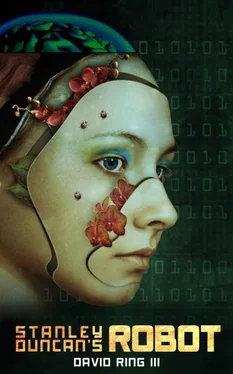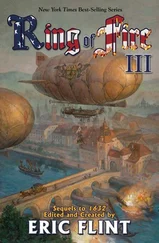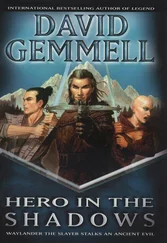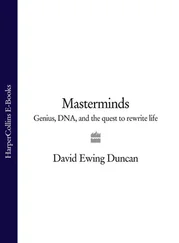Stanley leaned over and whispered into Dan’s ear, “Is this guy for real?”
Dan shrugged. “Are you going to tell us about fuse or not?”
“Like I said, I can tell you all about fuse, but the real reason for him sending you here has very little to do with that.”
“Which is?”
“He can’t come to terms with his wife’s choice to fuse out.”
“Frank never mentioned she fused out.”
“That’s right. He likes to pretend she didn’t.”
Stanley remembered the distant look on Frank’s face. It certainly was possible.
“What happened?” asked Dan.
“If you want to know more about that, you’ll have to ask him yourself.”
Stanley sighed. “So, what can you tell us?”
“I can tell you about the events that led to the proliferation of fuse, but that doesn’t mean you’ll listen. I can tell you about the powers that be and how they have been manipulating us for years, but that doesn’t mean you’ll do anything about it.”
Dan stood up straight, his eyes wide and eager. “We’re listening.”
The director looked at Stanley.
“Yeah, me too.” The words came out like a yawn, but it was all Stanley could do to not roll his one good eye.
The director ran his meaty fingers against the tabletop, tapping through several screens that had instantly appeared. Short video clips played across the table, showing innumerable men and women raging through the streets.
“The Great Layoff,” said Dan.
The director nodded. “It was a most interesting time.”
“Devastating,” said Stanley. “Who could have predicted that our technological advances would backfire on us? That we would reject science and industrial advancement, sending us into a depression that would threaten our very existence.”
“Where were you during it?” asked Dan.
“The same place I’ve been for most of the last twenty years. My condo. My job as a senior programmer was well-protected against replacement by AI, but that, too — I knew — wouldn’t last forever. Fortunately, I never faced the financial or personal struggles that my fellow Americans did.”
“Fortunately.” The director interlaced his fingers. “But for America, it was a catastrophe. The suicide rate surged, devastating the population. As people became more angry and distraught, violence spread. A massive divide formed between the ultra-rich and everyone else. As a war veteran, I felt it was my duty to help protect the country.”
“Which war did you fight in?”
“The war against the non-elite — though that’s not what they called it. I sat in an air-conditioned command center, overseeing the bombing of Yemen. I was told that we were helping liberate the people from an oppressive government — these were lies. It wasn’t war, it was terrorism. I destroyed schools, hospitals, women, and children.”
“God!” said Stanley.
“Somehow, I convinced myself that what I was doing was right. It wasn’t until years after returning home that I finally accepted the atrocities that I had committed.”
“You couldn’t have done anything about it,” said Dan. “They imprison and torture whistle-blowers.”
“Maybe,” said the director, taking a moment to chew on those words before resuming the documentary. The video played for a few seconds before he stopped it again. “In the wake of the Great Layoff, people lost their humanity, destroying with reckless abandon. It was utter insanity. I was here, studying at this very library, when a Molotov cocktail was launched through the window. A piece of shrapnel ripped through my eye. The heat cooked me alive.”
Stanley trembled. He couldn’t wait for this story to end.
“A young officer pulled me out of the fire. Evan Wilcox, Marshfield’s future police deputy. If it wasn’t for him, I would have lost much more than my eye.”
“That’s insane. Were there any children injured?”
The director nodded. “Several. But Evan and another officer saved them all. Everything inside was destroyed, and all that was left was a brick shell.”
“My God! How could anyone justify that sort of violence?” said Stanley.
“Speaking from experience, we humans are capable of horrible things. There is always an excuse that we can use to discard our responsibilities.”
The words burned in Stanley’s heart. For twenty years, he had hidden from the world. He had to protect the world from himself, and he had to protect himself from the world. A strong feeling of knowing moved up his spine into his head. Who, really, was this internal entity that needed protection?
“After I replaced my eye, I knew I had to do something to help. So, I approached Evan, told him about my experiences in the military, and asked how I could help.”
“You fought with him?”
“Fought? No. Evan told me that my duty was to get others to stop fighting each other. I created a support center here in the library, where I did my best to show people how to live a meaningful life without a job. Though I failed to—”
“He’s a madman,” hissed Stanley. “Deputy Evan Wilcox is an evil madman.”
“War changes people. I know it changed me. But back then, I knew of no man more honorable and courageous than Evan. It was an honor to be a part of his team. Marshfield is fortunate to have him.”
“That’s easy for you to say,” said Stanley. “But what about the machines he’s destroyed? He’s obliterated androids and cyborgs out of pure hatred.”
“How can you be so sure that he isn’t protecting us from them?”
“Because they’re not out to get us.”
“Are you sure about that? Look at what has happened since they entered the workforce. Humanity has crumbled.”
“But androids and cyborgs are bound by a rigid set of codes. They don’t make decisions like humans do,” said Dan.
Stanley fidgeted with his fingers. Something didn’t feel right, but he didn’t know why. “If anyone is responsible for their bad behavior, it’s the programmers. Or humanity.”
“Now you’re getting somewhere. But it makes no difference if they choose this path of destruction or follow orders like utterly obedient soldiers. They’re on a different side from us.”
“What are you talking about?” asked Stanley.
“It’s class warfare. And they — the elite — have all but won. They live in their mega-towers, enjoying the finest foods, drinks, and arts, protected and watched over by their private army of MBTA soldiers, while the rest of us fuse out and eliminate ourselves. I’ve told this to Frank a dozen times, but he’s refused to accept this. He wants to keep dreaming, selling his vegetables and pretending like everything is okay.”
“Let’s take a step back from the—” Stanley scrunched his nose “ — theory. What happened with your campaign at the library?”
“I was making a difference. But for every one person I got through to, five were unreachable. They either got hooked on fentanyl or were hell-bent on stirring up trouble. Small skirmishes between militia and drones popped off around the country. Humans had no chance against these unstoppable war machines, but they didn’t care. It seemed like mankind had lost its sanity, choosing death by drone over despair.”
“That’s insane,” said Dan.
“The resistance movement became more powerful and organized. Civil war loomed around the corner. When tensions were at their highest, fuse appeared, a panacea for all of our problems — and free for all.”
“It arrived just in the nick of time,” said Stanley.
“Yes, perfectly so — like they had planned it all along. Within weeks, the chaos ended, and the world began to slumber.”
“So, you’re saying that the elite used fuse to wipe us all out?”
Читать дальше












